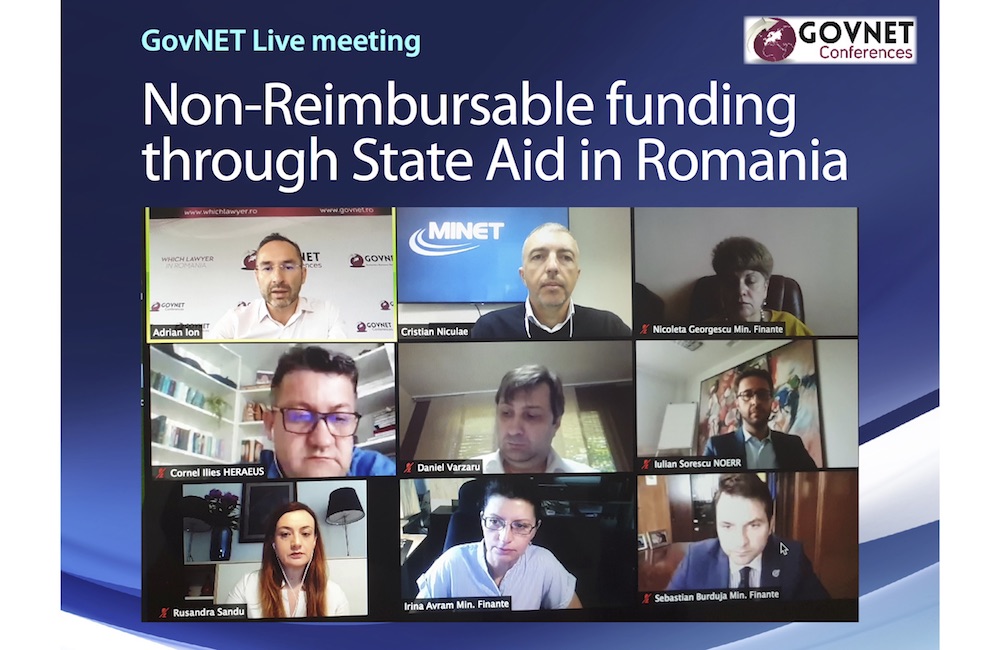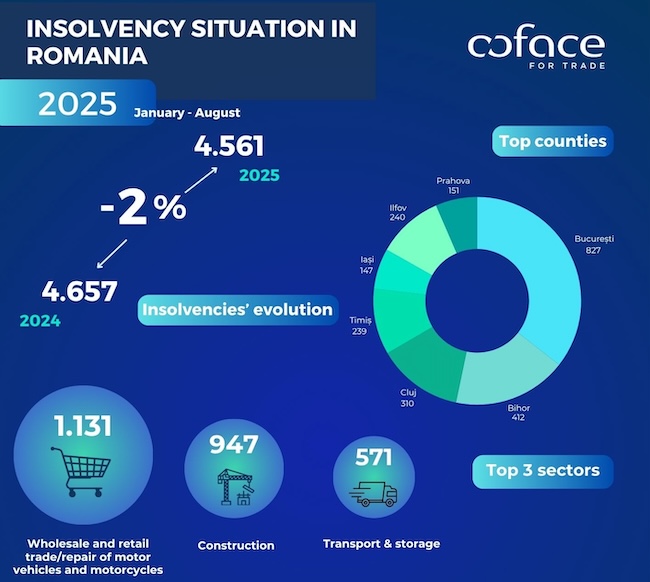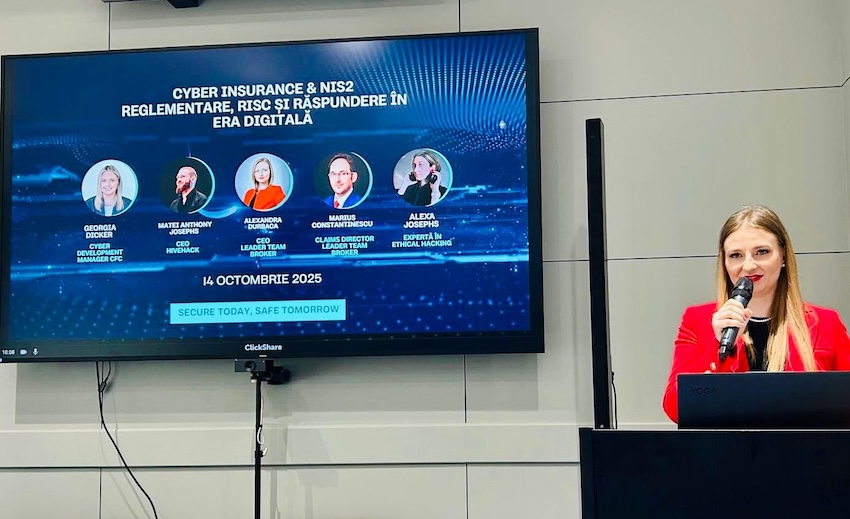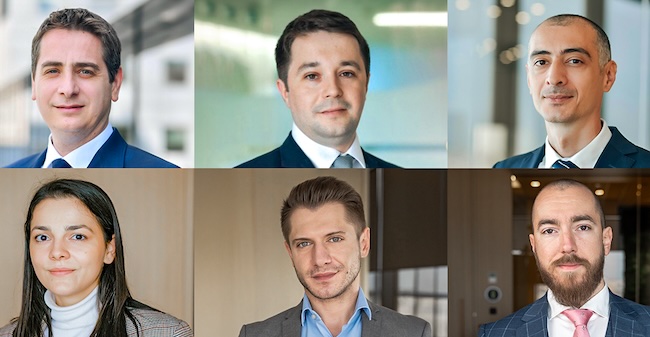Updates and practical implementation aspects for Non-reimbursable funding through State Aid

GovNET organized on May 21, 2020, the sixth edition of the online conference "Non-Reimbursable Financing through State Aid - Update and practical aspects of implementing the state aid scheme 2014 - 2020", having as guests the representatives of the Ministry of Public Finance - in the person of Mr. Sebastian Burduja, Secretary of State, Mrs. Irina Avram, General Director of the General Directorate of State Aid, Ministry of Public Finance, Mrs. Nicoleta Georgescu, Deputy General Director of the General Directorate of State Aid within the Ministry of Public Finance, Mr. Iulian Sorescu, Partner, Financial Consultant within the law firm Noerr, Mrs. Rusandra Sandu, Lawyer Partner Noerr, and from the beneficiaries of previous state aid programs Mr. Cornel Ilies, Chief Financial Officer, Heraeus Romania, Cristian Niculae, Commercial Director, Minet SA and Daniel Vărzaru, Chief Financial Officer, Universal Alloy Corporation Europe & Asia.
The conference managed to explain to the interested investors the opportunity to access state aid.
The objective of the state aid scheme 807/2014, with subsequent amendments and completions, is represented by the regional development by supporting the realization of large-scale investments with a value of at least 1 million Euro. The grant is awarded in the form of grants from the state budget for new construction, rental of existing buildings, the purchase of new technical installations, machinery and equipment, and the purchase of patents, licenses or other intellectual property rights.
The government has allocated a budget of 310 million euros for 2020, more than double the average annual budget regulated by state aid legislation. 2020 is the last year of the current cycle of non-reimbursable financing 2014-2020 of investment projects in assets of at least 1 million euros through state aid. There is the possibility that investors will no longer have the opportunity to apply for project financing at an intensity of 50% throughout Romania, but at lower percentages correlated with the level of development of each region in the coming years, together with the next financing plan. which will be regulated by a new legislative framework 2021-2027.
This scheme has been very successful in recent years, only between September 2018 and April 2019, the Ministry of Public Finance approving financing agreements for 28 investment projects. Doubling the annual amount allocated to the state aid scheme shows the intention to support investment and the private sector. Moreover, in 2019, the Ministry of Finance came up with a series of changes to make the 807/2014 state aid scheme more flexible and simplified. These included lowering the minimum ceiling for investment projects to be eligible for 1 million euros, the possibility of starting the investment project from the date of submission of the application for financing agreement and the simplification of the investment plan.
Thus, we consider it appropriate to organize an event in which we will discuss, together with authorities and people specialized in state aid, these changes, as well as other information on the entire process of application and implementation of projects funded by state aid.
"I hope that in all this context full of uncertainty, skepticism, scheme 807/2014, in general state aid, will be a source of confidence and optimism for the private environment in Romania," said Sebastian Burduja, Secretary of State in Minister of Public Finance. "There are almost 60 projects financed in five years by this scheme, a financing from the Romanian State for a total of approximately 2.5 billion lei in projects of over 7 billion lei as a total project value, there are over 11,300 jobs generated by these investments and from the calculations we have the multiplication factor is very good - over three, which means that scheme 807/2014 achieves its objectives to generate development, to support the private sector, to to support new investments. The contribution to regional development is estimated at 2.8 billion lei, ie the total taxes generated by the investment project to the local budget and the state budget. We are now evaluating with several options for improving this scheme, in relation to the impact generated by the funded or possibly funded projects, "Burduja added.
"I would make an appeal that exceeds the framework of the state scheme, because I know that many representatives of private companies are following us, we are in a period when we are in a position the need to restart the economy is great, the appeal we make to Romanian entrepreneurs is to think very well about the business model they had and what the post-Coronavirus world will look like, and if there are things they can do to be more competitive, we welcome your requests from the private sector and will we challenge you not to waste the opportunities brought by this crisis! ”
Iulian Sorescu, Partner, Financial Consultant at the law firm Noerr added that “Scheme 807/2014 works very well, but in the discussions with investors, we understand that it would be a demand for other types of schemes that currently do not exist: the opportunity to open Scheme 332 for Job Creation, or maybe take inspiration from the success stories of our Western neighbors - Hungary, Poland, who have state aid schemes for Research & Development, for Training, practically state aid schemes for areas with high added value. ”
Burduja: “Since taking this direction, we have shown a great openness to the private environment, to clarify together any necessary aspects, we are at a distance by phone or email. We have a generous allocation for this year, we encourage you to come up with projects. The Romanian government has focused a lot on the area of new investments, including infrastructure investments, and this approach will continue. Regarding the future of financing schemes, Burduja confirmed that variants of state aid financing are being continued, given that in the current context determined by Coronavirus, the European Commission has made the state aid framework more flexible, so that Romania has could already benefit from several other schemes such as SME Invest, but soon follows the state aid scheme for large taxpayers, developed through Eximbank.
On the VAT refunds, the Ministry of Public Finance made a great effort, said Burduja, in two months 9 billion lei were reimbursed, which puts pressure on the flow area. In addition, during the emergency situation, the VAT was reimbursed in record time, within days.
"Given the results of this scheme, we want to continue in one form or another. It is a competitive scheme and worth generously budgeted. This year we have enough money in the budget to finance projects, over 1 billion lei at the moment, we are waiting for strategic projects. Europe and the United States are in the process of decoupling from Chinese production, China-focused supply chains have shown in this context that we are somewhat vulnerable. We want to relocate these production capacities to competitive markets where the cost of labor is still reasonable, as it is in the Romanian market "said Sebastian Burduja.
"We, having regional practice, know what investors receive in other countries, when we compare Romania with Hungary, Poland, the Czech Republic, Romania has the highest percentage of state aid - 50%, and in Romania the vast majority of state aid is cash, which attracts investors, and makes a difference "added Iulian Sorescu, emphasizing Romania's activity as an investment destination.
Irina Avram, Director General of the Directorate General of State Aid, Ministry of Public Finance presented a summary of financing schemes and stressed that the state aid scheme is regional, intended for investments with significant impact on the economy, the only one in which large projects are eligible investment, the maximum amount available as state aid for an investment project is 37.5 million euros. "We wish for the future for this scheme, and after 2020. During yesterday (May 20, 2020) we received from the European Commission several draft regulations, including one to extend the provisions of Regulation 651 until 2023, which means that our state aid scheme after European approval could be extended for the selection of new investment projects until December 31, 2023, a significant period, "said Avram.
The northwest region is the leading region in terms of value of investment projects, the west region has a small concentration of investment projects, the south region also benefits from major investment projects. The highest investment values by activity went to the automotive industry with an investment value of over 2.8 billion lei, followed by the spacecraft industry with approximately 939 million lei, then the household appliances industry with approximately 919 million lei, food industry with 463 million lei, machines / equipment, paper / cardboard products and other fields.
"The deadline for issuing the financing agreement under this scheme is December 31, 2020, which means that the investor must take into account the analysis period, in my opinion, a file submitted in early September has a chance to finance until December "says Avram.
Regarding the CANE code of the investment project activity, it does not matter if it is main or secondary, it is relevant that that CANE code is not on the annex to the Government Decision containing the excluded CANE codes, which are not eligible to receive financing agreement . "
"A draft amendment to the Government Decision has already been drawn up within the State Aid Directorate, on two levels: first of all, we must take into account the economic effects that this Coronavirus epidemic has generated on the projects. of investments that are already approved, that already benefit from state aid, are in the payment procedure or are in the monitoring procedure, the projects being completed - and here we speak especially from the perspective of the obligation to make that contribution to regional development, respectively those taxes and duties in the amount that investors have assumed in a context in which no one anticipates that this unfortunate period will come in which the world economy has almost closed for two months, and no one can anticipate when the situation will return to normal.We want to propose a mechanism in which to take these effects into account and so that that contribution to regional development to reschedule it, to rethink it so as to give the possibility to those investment projects to continue, to restart, to redevelop, to make that contribution and not to wake up in the situation of penalizing those companies for reasons related to force majeure and which are in no way attributable to investors.
The second plan to change the government decision that we are pursuing, given the current context in which of course the investment appetite is clearly diminished, we are thinking of finding some conditionalities maybe a little more relaxed, a little easier, a little more stimulating , of course without renouncing those conditionalities that derive from the European regulation. We are thinking about the other conditions provided in the state aid scheme so that the scheme becomes more flexible, and the possibility to access the state aid is easier. These are the two plans we are following, we are still in internal consultation, as soon as we finish it, we will publicize this project and we are open to suggestions from the business environment "added Irina Avram, General Manager of the General Directorate Help of State, Ministry of Public Finance.
Rusandra Sandu, Partner Lawyer at the law firm Noerr added “I could confirm from practice what Mrs. Avram says, and especially during this lockdown period the Ministry of Finance and the State Aid Directorate worked extremely well, yes. there were even financing agreements and approvals, and the communication, independent of this physical form of submitting the documents we were used to, worked extremely well online and by mail. During the 12 years in which we have been dealing with state aid projects, we have definitely noticed an increase of the overall flexibility of state aid schemes. Until placing the application with the Ministry of Public Finances, potential state aid beneficiaries are not allowed to get into any binding commitments with respect to the investment project for which financing is requested. The land can be purchased, but equipment cannot be ordered, people cannot be hired, contracts cannot be signed until the application is submitted as such to the Ministry of Public Finances for approval."
Regarding the technical unemployment, receiving questions from the audience, Irina Avram specified that for those newly created jobs for which the Ministry of Finance has already granted state aid on the respective salary expenses, when entering the technical unemployment , if money is received on technical unemployment, we can no longer grant state aid during this period. When these jobs come out of technical unemployment, we will resume paying state aid, but we cannot double the two types of state aid on the same eligible expenses.
Nicoleta Georgescu, Deputy General Director of the General Directorate for State Aid, Ministry of Public Finance stated in the intervention that “The procedure for approving the modification of the investment timetable is provided in the Government Decision and detailed in the guide: within 30 days the beneficiary of state aid, who has a financing agreement, finds and is determined that he must extend that institutional calendar, must notify us and attach a substantiation of the request to amend this calendar. There must be a decision of the shareholder of the company stating that it wishes to extend this calendar, and a substantiation regarding the request for this change, as in most cases is the impossibility of the supplier to deliver the respective equipment. A new investment calendar must also be presented, and implicitly if there are other changes regarding the initial business plan that was the basis for the issuance of the financing agreement by the Ministry of Public Finance. After analyzing this documentation, we will issue an amended financing agreement, the legal act underlying the granting of state aid from that moment on; this agreement will provide a new investment timetable as requested by the investor, and a new timetable for the payment of state aid.
Regarding the change of the structure of the products, if it remains within the same CANE code, there is no problem regarding the eligibility of the investment project. If the equipment for which the financing was obtained remains in the company's patrimony, it will make its contributions to the regional development, and the results of the activity remain within the same CAEN, there is no problem of adapting the production. "
“I want to stress out again that applying for state aid is not such a difficult job" says Iulian Sorescu, Noerr. "The application you have to fill in is very reasonable and as long as you have a prudent attitude when describing and preparing your business model, success is guaranteed. Also the statistics of the Ministry of Public Finance are very encouraging, with about 60 approved projects in the recent years. As Mr Burduja mentioned, let’s be confident and use the crisis as a moment of opportunity. Investors who trust themselves and know that their long-term plans will not end with this crisis, can use this opportunity and apply now for state aid for an investment that will be deployed during the next 2 years. At that time, the economy will have recovered, whereas your investment will be at full capacity” added Sorescu.
Cristian Niculae, Commercial Director, Minet SA, one of the beneficiaries of state aid financing, provided information about the experience in accessing funds: “Our project had only equipment, not construction, financing of 5.7 million euros - the equivalent of 32 % of the investment, we are a Romanian company and for us it was not difficult, there were many things that I did not know initially, now, after going through them, it does not seem difficult at all. I encourage everyone who wants to start such a project, because all things are manageable. The trucks with our equipment are on the road, we have not received them yet, in September we will have the start-up. "
Also as a case presentation, Cornel Ilies, Chief Financial Officer, Heraeus Romania said: “Now that we have gone through all the phases of approval, implementation and we are at the moment of implementing the investment project, it seems easy. But the idea of achieving a financial model in the current conditions of business challenges does not seem like my easiest mission. But I think that at the moment having a long-term strategy is more essential than ever. I recommend to those who want to apply to have a realistic approach, to consider the translation and conversion of figures from the business plan into data that can be implemented and that can be phased during the project mobilization period. Another recommendation refers to the involvement of all decision makers within the company in building the application, and in building the financial model, thus creating that commitment of the entire team to deliver the promised results. The final recommendation refers to the attention to choose the partner, the consultant, it is important to have an experienced partner. Noerr, with whom we worked, came up with a very clear action plan, we knew at all times who had what to do, and the deadline by which he had to deliver. They provided us with a set of tools through which we managed to translate all things into concrete data and they were also a kind of challenger, always trying to moderate us, to weigh us, to advise us. It's worth the effort!"
Iulian Sorescu added that companies that applied last year for the reimbursement of state aid and submitted the application until September, saw each other until the end of December. The term for solving the applications is generally three months, a much shorter period than in previous years when the average was six months.
Daniel Vărzaru, Chief Financial Officer, Universal Alloy Corporation Europe & Asia, the representative of a company with experience in accessing funds said: “The changes to the state aid scheme operated in 2018 were very auspicious, creating investment potential in Romania. We compared the state aid schemes with the existing ones in Hungary, Poland, and we were proud that the Government managed to make these changes and we were the beneficiaries after these changes of an approved project. I can compare the reimbursement method of last year, before the Covid crisis, with what happened this year, things are much more flexible, I thank those from the State Aid Department for doing this and that things can change for the better in Romania as well. The application is also much simplified. "






